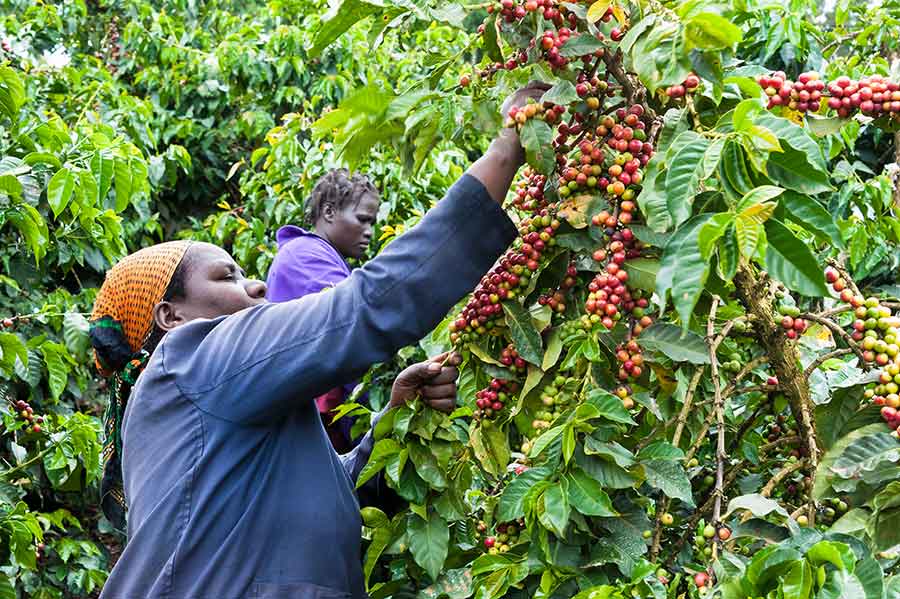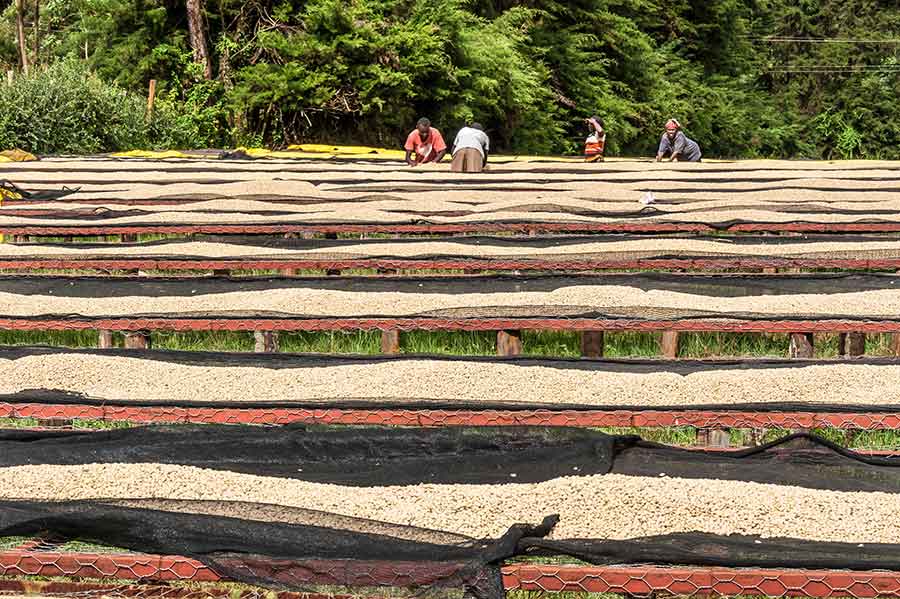-
Producer
-
Murue Farmers Cooperative Society
-
Country
- Kenya
-
Region
-
Kavutiri County, Eastern Province
-
Altitude
-
1800m above sea level
-
Varieties
-
Process
-
Harvested
-
December 2015
-
Importer
-
Melbourne Coffee Merchants
-
Body
-
Medium
-
Acidity
-
Vibrant
-
Tasting notes
-
Finger lime, blackcurrant, raspberry
-
Roast style
Kenya
Kianyangi
2018We’re back in Kenya to bring you a delicious coffee from Kianyangi, a washing station which has previously won the Dorman Quality Competition for the Embu district.
The Kianyangi washing station (or ‘factory’ as they’re known in Kenya) is owned by the Murue Farmers Cooperative Society. The co-op is made up of around 750 farmers, with each growing around 130 trees on their farm.
Kianyangi washing station is located in Kavutiri, near the city of Embu in the Eastern Province of Kenya. The region borders the iconic Mount Kenya and Kamithumo river, which is the primary water source for coffee processing at the factory.
The main harvest for Kianyangi is from November to March. The farms sit at an average altitude of 1,800m above sea level, and their rich volcanic soil and ideal conditions to produce exceptional coffee. Most of their trees are SL28 and SL34 varietal; and around 10% is Ruiru 11.
 Photo: Melbourne Coffee Merchants
Photo: Melbourne Coffee Merchants
Processing coffee at Kianyangi
After picking, ripe coffee cherry is brought to the washing station by smallholder farmers before it’s processed to remove the skin and pulp: what’s known as wet processing.
Five soaking pits have been established for wastewater management, and any waste water is also recirculated.
The factory uses a disc pulper with three separate discs to remove the skin and fruit from the inner parchment layer that is protecting the green coffee bean.
After pulping, the coffee is fermented overnight to break down the sugars, after which the cherry is cleaned and soaked for a further 24 hours. This process increases the proteins and amino acids, increasing the complexity of the acidity and clarity in the cup.
 Photo: Melbourne Coffee Merchants
Photo: Melbourne Coffee Merchants
The coffee is then spread out on the raised drying tables. Time on the drying tables depends on climate, ambient temperature and volumes under processing, and can take from 7–15 days in total.
Improving quality
Like Kiamabara who we’ve previously featured, Kianyangi currently receives assistance from Coffee Management Services (CMS), who have been on the ground directly helping producers improve their farm’s productivity and quality through training and education programs.
In addition farmer members can get access to financing through free advances on payments before the season starts. The objective of the service is to establish a transparent and trust-based relationship with the smallholder farmers, helping to support sustained industry growth. Doing this helps drive continued improvements in quality which will earn the farmers a premium over lower quality crops.
Learn everything about this coffee:
Ethical, traceable sourcing
This page has all the sourcing information (variety, process, region, story, importer, and more) that our importers share with us, and give us permission to use.
The transparency helps us talk confidently about the quality and background of our product, and it helps you know exactly what you’re buying.
Learn more:
Coffee page transparency legend
Our coffee philosophy
Our business approach
Fresh harvest coffee
We only source and roast coffee from each country’s latest harvest season (so the green coffee is never older than 1 year from the time of picking, processing and packing). This ensures the sensory qualities are always at their peak and unaffected by excessive ageing.
Roasted for espresso and filter (best enjoyed black)
Roast style: omni. Omni roasts are designed to brew and taste great both as espresso and filter. Our omni single origins generally sit on Agtron values in the ~70-60 value range. So, technically, they are somewhere in the lighter side of the medium spectrum.
Designed for espresso and filter brewing. Best enjoyed black.
Learn more:
Our Loring Kestrel S35 roaster
Our roasting style and approach
Best brewed within days 15-49 post-roast
The ‘fresh is best’ saying doesn’t apply to coffee (contrary to popular belief). Waiting before opening and brewing your bag of whole coffee beans helps develop peak flavour and acidity.
But heads up: if you buy pre-ground coffee, brew it as soon as possible.
Learn more:
Our recommended brewing window
Try our custom brewing recipes
Our recipes and ratios are tailored to our coffee sourcing and roasting styles, bringing the best flavour and feel out of each coffee.
For pour over, immersion, and other filter brewing styles, check our brew guides.
For our espresso single origins, we recommend a coffee:yield ratio of 1:3:
- Dose: 20g ground coffee
- Yield: 60g espresso
- Total brew time: ~24-28 seconds
This is just a starting point! We encourage you to experiment, taste, and adjust to find the recipe that you enjoy the most.
Learn more:
Our espresso brew guide (single origin)
Brewing ratio calculator
Packaging and sustainability
- Bags: ABA-certified home compostable (AS 5810-2010)
- Labels: recyclable
- Valves (only on +250g bags): general waste
- Box and tape (online orders): recyclable
Learn more:
Our packaging
Varieties
Ruiru 11 variety
Released in 1985, Ruiru 11 is a disease resistant varietal developed in Kenya
SL28 variety
SL28 was developed in 1931 by Scott Laboratories to suit the growing conditions in Kenya. The varietal is known for its exceptional cup quality
SL34 variety
Developed by Scott Laboratories in Kenya, the SL34 varietal was designed to be high yielding with good cup quality.
The location
Coffee from Kenya
Alongside Ethiopia and Colombia, Kenya is one of the origins we get most excited about at the roastery. It exports some of the most vibrant, bright, and unique coffees in the world.
Farm processes
Washed process
Machines are used to remove the flesh from the coffee cherry before being fermented in water, washed again, and finally sun dried. This process tends to result in more distinct, cleaner flavours.
1 brew note from subscribers
Kenya Kianyangi 2018
Reuben’s Chemex
Sample Coffee Team
- 36g
- 600ml

Subscribe to a world of coffee
Discover a new single origin coffee from Sample every 1-5 weeks with no delivery fees.
No up-front purchase, and you can pause, cancel, or change plans at any time.
Available to order online this week:

Ethiopia Tadese Teko
Flavours of bergamot, mandarin, mango
Body Acidity
Washed Ethiopian Heirloom
January 2025 harvest
Roasted omni for filter and espresso
Ethiopia Tadese Teko online
Kenya Karimikui
Flavours of blood orange, blackberry, plum jam
Body Acidity
Washed Batian, SL28, SL34, Ruiru 11
November 2024 harvest
Roasted omni for filter and espresso
Kenya Karimikui online
Rwanda Kibirizi
Flavours of mandarin, raisin, apple
Body Acidity
Washed Bourbon
June 2025 harvest
Roasted omni for filter and espresso
Rwanda Kibirizi online
Colombia Rigoberto Chavarro
Flavours of brown sugar, wine gum, candied stone fruit
Body Acidity
Washed Pink Bourbon
February 2025 harvest
Roasted omni for filter and espresso
Colombia Rigoberto Chavarro online